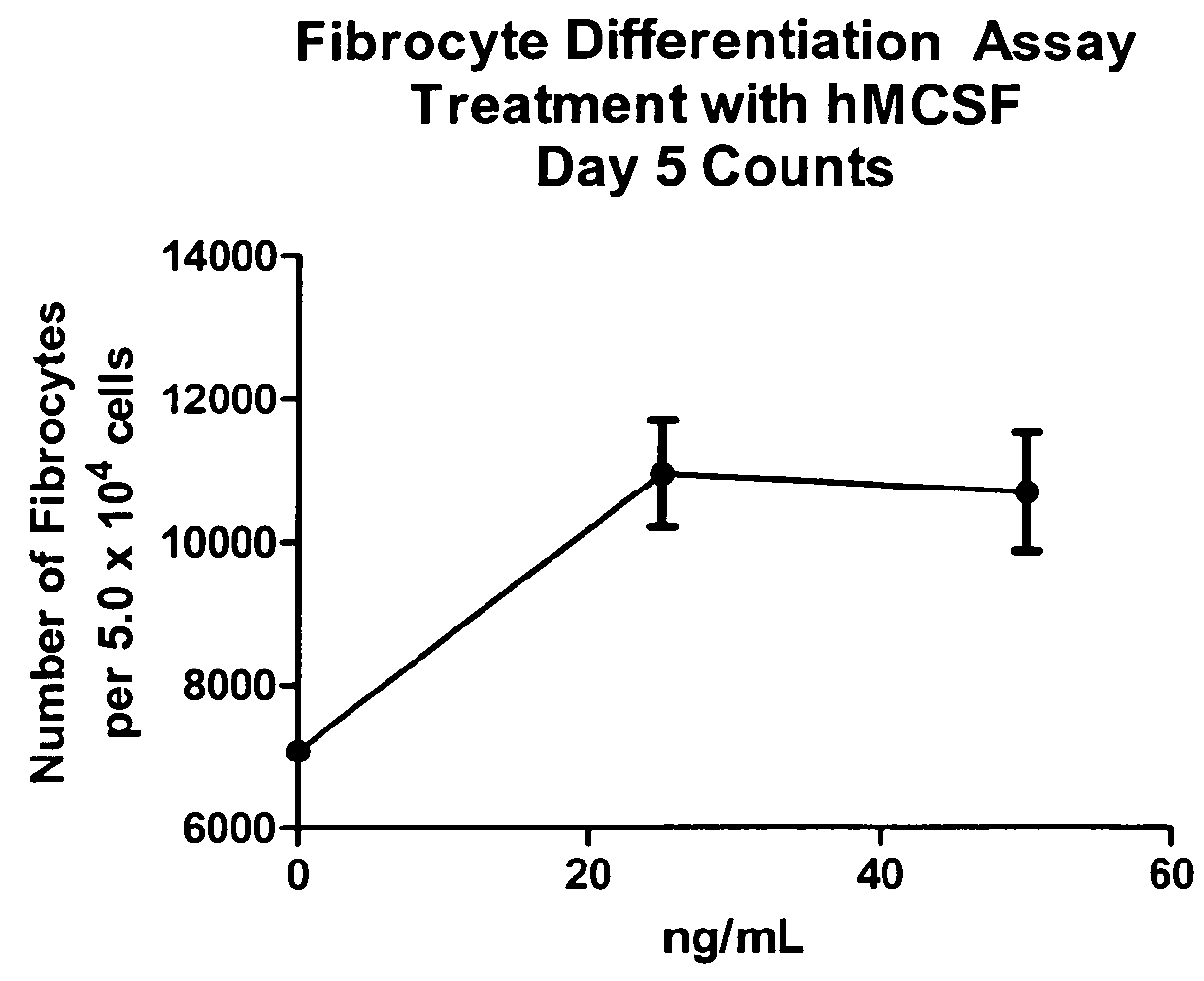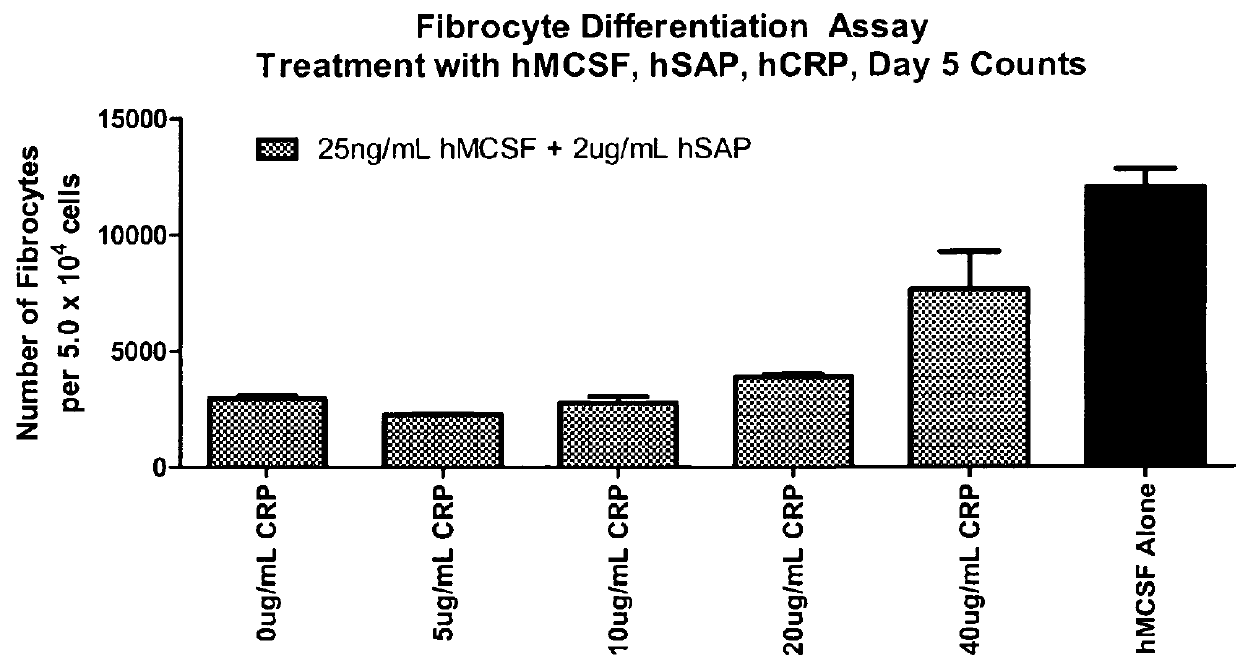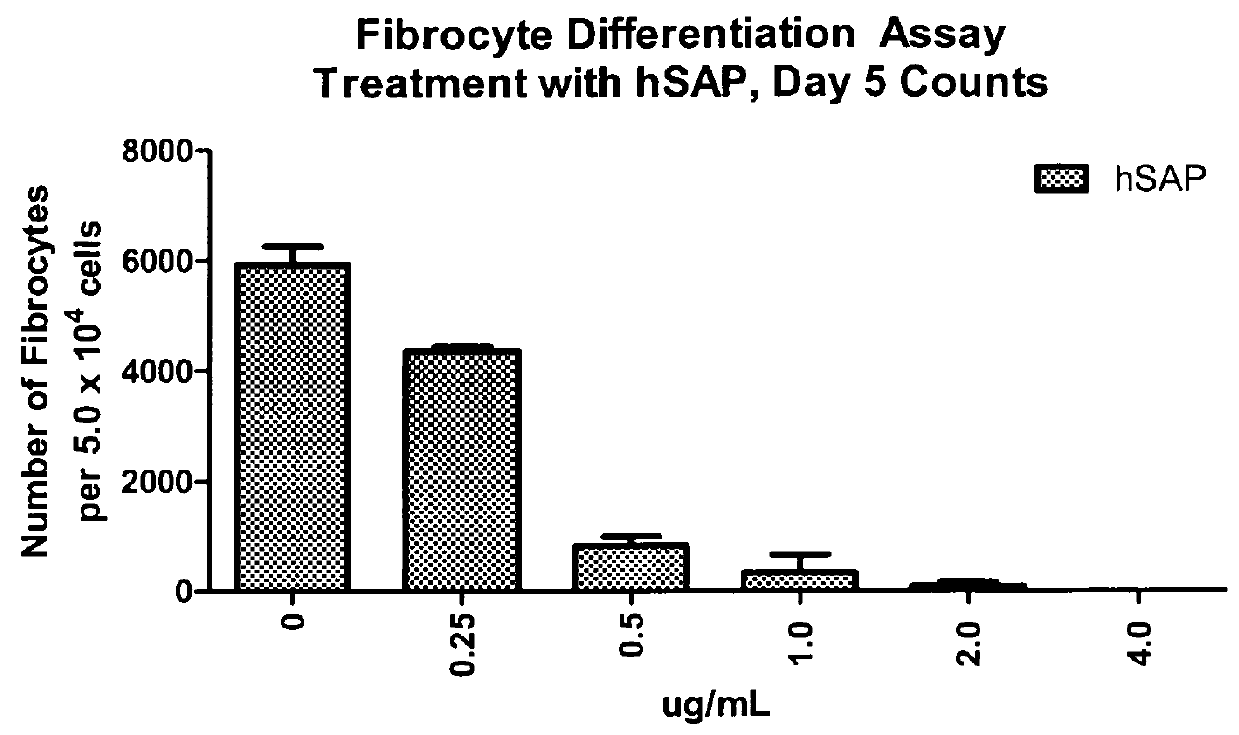Methods for treating fibrosis using CRP antagonists
a technology of fibrosis and fibroblasts, applied in the field of treating fibrosis using crp antagonists, can solve the problems of extensive tissue remodeling, permanent scar tissue formation, and pathogenic repair process, and achieve the effect of treating, preventing or reducing the severity of fibrosis related disorder in a patien
- Summary
- Abstract
- Description
- Claims
- Application Information
AI Technical Summary
Benefits of technology
Problems solved by technology
Method used
Image
Examples
example 1
Models to Determine Target SAP-to-CRP Ratio for Inhibiting Monocyte Differentiation
Fibrocyte Differentiation Assay
[0234]Monocytes were purified from whole blood-derived PBMC using negative magnetic bead selection standard in the art (e.g. CAT#113-41D, Invitrogen, Carlsbad, Calif.) and cultured in a 96-Well tissue culture plate containing FibroLife Media supplemented with 25 or 50 ng / ml of M-CSF in triplicate. The plate was incubated for 96 hours at 37° C. in a 5% CO2 incubator. The cells were then fixed with paraformaldehyde and stained with Hema 3 stain (Cat #122-911, Hema 3 Stain, Fisher Scientific, Hampton, N.H.). The number of fibrocytes per well were determined by summing the count of five different fields per well using an inverted microscope. Fibrocytes were defined morphologically as adherent cells with an elongated spindle-shape and the presence of an oval nucleus. The data indicated that either 25 or 50 ng / ml of M-CSF was sufficient to increase the number of fibrocytes dif...
example 2
In Vivo Model Systems
(i) Bleomycin-Induced Lung Fibrosis
[0243]Pulmonary fibrosis is produced in male Sprague-Dawley rats weighing 200-250 grams. An endotracheal dose (via transoral route) of 2.5-6.67 U / kg of bleomycin dissolved in 0.9% sodium chloride at a volume of 0.67 mL / kg is administered on Day 0.
Study Group 1
[0244]On study Day 1 serum concentration for both SAP and CRP are determined. The ratio determined on Day 1 is used to calculate the dose of SAP needed to reach the target ratio defined in example 1. The calculated dose is administered on Days 2, 4, 6, 8, and 10. Rats in the treated group are dosed intravenously via tail vein with SAP at a dose volume of 2-10 mL / kg. Untreated rats are dosed with 2-10 mL / kg of saline.
[0245]On Day 14 lung function is assessed by measuring blood oxygen saturation (pulse oximetry) and / or PO2 (blood gas analyzer); breath rate and heart rate are also measured. The animals are then sacrificed, and the left lung is processed for total collagen con...
example 3
atios in Human Cardiovascular Disease
[0275]In a recently published clinical study, circulating SAP concentrations were measured in patients with subclinical and clinical cardiovascular disease (CVD) in older adults from the Cardiovascular Health Study (CHS) (Jenny et al. 2007. Arterioscler Thromb Vasc Biol. 27: 352-358). In Cox regression models adjusted for age, sex, and ethnicity, a standard deviation increase in SAP was associated with angina and MI, but not stroke or CVD death. However, in this study determination of a ratio of SAP to CRP was not conducted. We conducted a prospective analysis of the data to determine the SAP / CRP ratio in each patient included in this study and then determined the association of this ratio with disease incidence (Table 2). There was a statistically significant association of lower SAP / CRP ratio relative to controls in patients with Stroke, CVD Death and all deaths. Importantly, these associations were not recognized in the original published stud...
PUM
| Property | Measurement | Unit |
|---|---|---|
| concentration | aaaaa | aaaaa |
| concentration | aaaaa | aaaaa |
| concentration | aaaaa | aaaaa |
Abstract
Description
Claims
Application Information
 Login to View More
Login to View More - R&D
- Intellectual Property
- Life Sciences
- Materials
- Tech Scout
- Unparalleled Data Quality
- Higher Quality Content
- 60% Fewer Hallucinations
Browse by: Latest US Patents, China's latest patents, Technical Efficacy Thesaurus, Application Domain, Technology Topic, Popular Technical Reports.
© 2025 PatSnap. All rights reserved.Legal|Privacy policy|Modern Slavery Act Transparency Statement|Sitemap|About US| Contact US: help@patsnap.com



